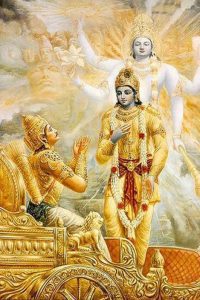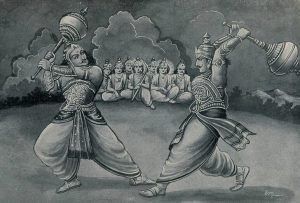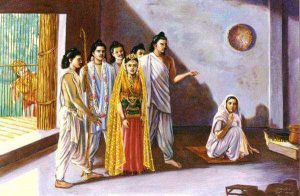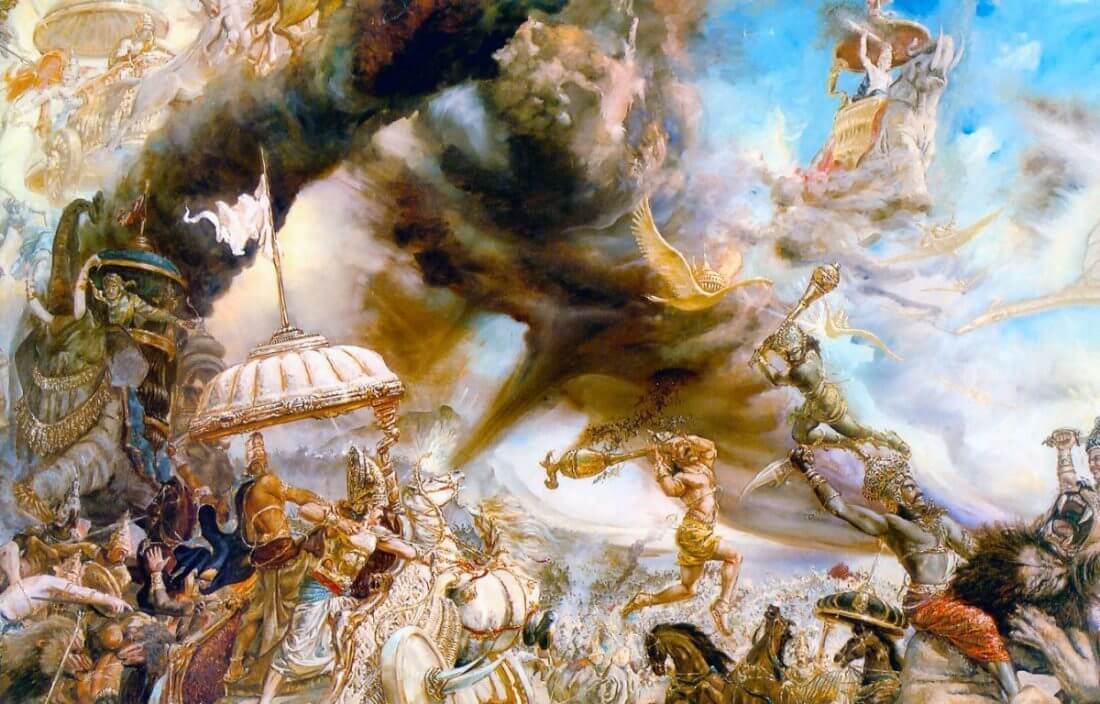Ruchira critiques The Mahabharata, the epic, as she sees it. An exclusive for Different Truths.
 I am not religious minded or devout per se. Though born of Hindu parents I do not subscribe to the paraphernalia of rites and rituals. However, I have some basic knowledge regarding the scriptures of this faith. And out of the entire lot, I harbour profound regards for The Mahabharata! To me, The Mahabharata is downright pragmatic and practical. More than sacred text it is a handy manual to steer human beings through the toughest situations and crises, which occur in their lives.
I am not religious minded or devout per se. Though born of Hindu parents I do not subscribe to the paraphernalia of rites and rituals. However, I have some basic knowledge regarding the scriptures of this faith. And out of the entire lot, I harbour profound regards for The Mahabharata! To me, The Mahabharata is downright pragmatic and practical. More than sacred text it is a handy manual to steer human beings through the toughest situations and crises, which occur in their lives.
As the epic unfolds, we find King Santanu heartbroken because his spouse Ganga (the sacred river) has departed, leaving him with their offspring Devavrata. Years later the youthful prince finds his father besotted with a voluptuous fisherwoman, Satyavati. To placate his father not only does he negotiate the match but in order to avoid complications regarding ascendance to the throne – self versus Satyavati’s unborn sons – also vows to remain celibate lifelong.
When it is time for his very young stepbrother Vichitravirya’s matrimonial alliance, Devavrata (now, Bheeshma) attends the swayamvar organised by the ruler of Kashi for his three daughters – Amba, Ambika, Ambalika – and quietly abducts them.
Later, when it is time for his very young stepbrother Vichitravirya’s matrimonial alliance, Devavrata (now, Bheeshma) attends the swayamvar organised by the ruler of Kashi for his three daughters – Amba, Ambika, Ambalika – and quietly abducts them. Logic: Satyavati’s first son Chitrangad died prematurely. The throne of Hastinapur needed an heir. Since he was not in a position to provide, one the alternative was to get his sibling married.
The dowager Satyavati stepped in. She summoned her other son (fruit of a casual amour with sage Parashar) to provide heirs to the royal family.
Unfortunately, Vichitravirya died issueless. The dowager Satyavati stepped in. She summoned her other son (fruit of a casual amour with sage Parashar) to provide heirs to the royal family. And the rest is history.
Dhritarashtra and Pandu were Vyas’s sons, albeit from different mothers, i.e., Ambika and Ambalika. This saga of target-oriented sex whether in matrimony or out of it permeates to the next generation. Unfortunately, Pandu had been cursed to sterility by an infuriated sage. Hence his two wives Kunti and Madri rather nonchalantly got their progeny fathered by different deities. For instance, Arjuna’s father was Indra; Nakul and Sahdev were sons of Ashwini Kumars, the celestial physicians. Moral of the story thus far: Dynasties, family lineages must continue. Male heirs must be begotten, whatever it takes. The end justifies the means.
As the war progresses and Dronacharya assumes the stewardship of the Kaurava army, Lord Krishna advises Arjuna that the thespian must be slain.
There are numerous instances of goal-oriented actions, thoughts and utterances

throughout the magnum opus. As the war progresses and Dronacharya assumes the stewardship of the Kaurava army, Lord Krishna advises Arjuna that the thespian must be slain. Since Dronacharya’s Achilles heel was his son, Ashwatthama, the Pandavas hit upon a novel idea: Bhima killed an elephant named Ashvattama and shouted, “I have killed Ashvatthama.”
Krishna asked the Pandavas to spread the false news that Drona’s son, Ashwatthama, had been killed. A shell-shocked Drona refused to believe the news. In sheer despair, he turned to Yudhisthir – considered an epitome of honesty – for verification. Yudhisthir uttered his famous half-truth: Ashwatthma hatha (Ashwatthama is dead) he shouted, mumbling to himself Iti gaja (I mean the namesake pachyderm). The din and noise of the battlefield drowned the second phrase. The distraught father laid down his arms, and instantly was slain by the warrior Dristadyumna.
Unlike the Ramayana, The Mahabharata is utterly devoid of maudlin ideology and emotional tear jerkers.
Unlike the Ramayana, The Mahabharata is utterly devoid of maudlin ideology and emotional tear jerkers. Inspite of being Bheeshma’s most favorite great-nephew, Arjuna goes ahead and annihilates the grand old man, thus doing his “duty”. Then he retires to mourn in private. All is fair in love and war seems to be the keynote all through. No wonder an unarmed defenceless Karna is killed by his younger sibling Arjuna.
Much earlier, while making good their escape from the “house of lac” the Pandavas doped a female Nishaad (huntress) and her five sons, who eventually perished in the inferno. The Kauravas were fooled into assuming that it was Kunti and her sons.

Towards the fag end of the story when Bhima and Duryodhana are locked in a wrestling bout, Lord Krishna slyly asks Bhima to hit Duryodhana on his weak thighs, in order to crush him. A gross violation of ethics, which advocates that no adversary must be hit below the belt!
Its women characters are straight forward so far as their sexuality is concerned.
I also think the Mahabharata contains feminist nuances. Its women characters are straight forward so far as their sexuality is concerned. As is well known, the valiant Karna was born out of Kunti’s dalliance with Surya (Sun God). There are divergent opinions concerning Draupadi’s polyandry. Some scholars frown upon her, branding her a harlot. The sympathetic ones feel she was a victim of circumstances as were her five husbands – they merely obeyed their mother Kunti’s command: share your possession equally among yourselves.
Draupadi, however, remained undaunted, maintaining a lifelong relationship with five brothers/husbands.
At the risk of incurring the wrath of scholars and veterans, I would like to put down my two-point defence. Firstly, if Draupadi had found the idea of a conjugal relationship with five spouses abominable, she could have firmly put her foot down, (her mother in law’s bizarre diktat be damned). That she didn’t. Evidently, she was not averse to sexual adventures within matrimonial boundaries. Secondly, polygamy was a household word in Indian society since antiquity. It was a male monopoly. If a woman dared to be different, naturally, eyebrows would be raised. Draupadi, however, remained undaunted, maintaining a lifelong relationship with five brothers/husbands.
Sex was not a taboo during the era of Mahabharata. There were multiple choices, which were duly availed of by folks.
All in all, sex was not a taboo during the era of Mahabharata. There were multiple choices, which were duly availed of by folks. During their exile, Bhima married

Hidimba, a demoness (rakshasi). The ‘fruit’ of their union was the courageous Ghatotkacha. Likewise, many years later after the Pandavas had settled into their royal household, Arjuna, during his tour of northeastern India, met and had a whirlwind affair with Uloopi, a snake princess. A son named Iravan was born to them. Around that time Arjuna had a passionate liaison with Chitrangada, a Manipuri princess. A son Vabruvahana was born to them.
The Queer community is depicted as enjoying prominence in the Mahabharata.
The Queer community is depicted as enjoying prominence in the Mahabharata. During their final exile, the Pandava lived incognito at the royal court of King Viraat. Arjuna, who essayed the role of Brihannala, a transgender music maestro, was held in high esteem by his royal pupils. Remember Amba who swore vengeance on Bheeshma for ruining her life? Well, she was reborn asShikhandi a transgender sibling of Draupadi, princess of Panchal. He played a key role in the war – as the nemesis of Bheeshma.
I am sure you will agree with me that The Mahabharata vividly mirrors basic Indian psyche, an ethos the way it has been since hoary past. One can easily empathise with and relate to the Epic’s content. Nothing is strange or unfamiliar. No unchartered territory. A sense of déjà vu prevails.
No wonder there is an oft-quoted belief: Ja nei Mahabharate ta nei Bharate (If you can’t find it in Mahabharata you won’t find it in Bharat/India either).
The opinions expressed in this article are that of the author and not that of Different Truths.
Photos from the Internet






 By
By


 By
By
While the writer has expressed balanced opinions on issues germane to her, what I find fascinating is the Gita part of the epic…It is the world’s first war fighting doctrine and has not been bettered by any one since – and that includes Kautilya, Sun Tzu, Machiavelli, Napoleon and MacArthur…